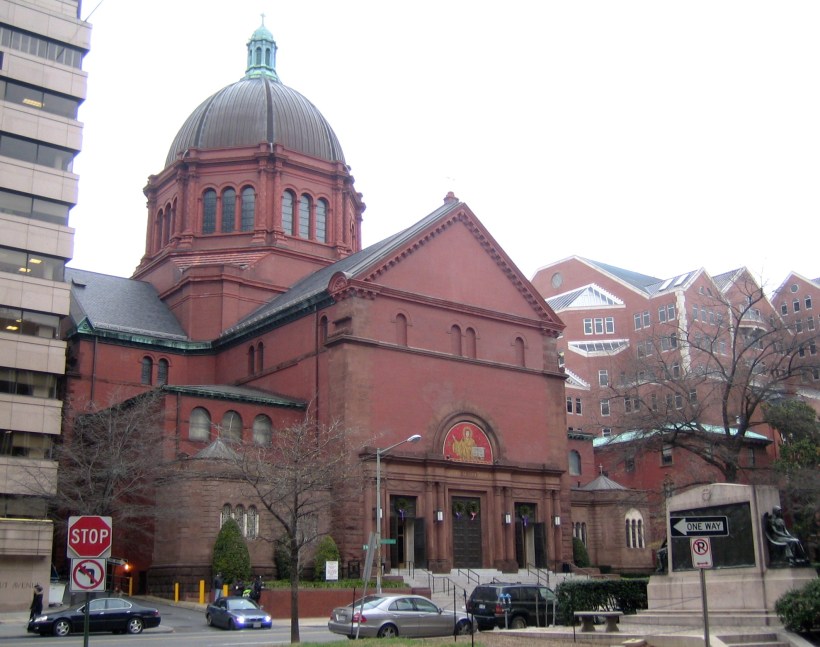We Catholics call Abraham “our father in faith.” Abraham, that we read about in the Bible, in the book of… Genesis.
 Our first reading at Sunday Mass, from Genesis chapter 22, illuminates how Abraham became our father in faith. Namely, by establishing the People of God. And by obeying God with complete self-abandonment.
Our first reading at Sunday Mass, from Genesis chapter 22, illuminates how Abraham became our father in faith. Namely, by establishing the People of God. And by obeying God with complete self-abandonment.
Abraham had received his long-awaited child, the son through whom he was to become the father of countless descendants. Sarah had given birth to Isaac, and the child had become the joy of Abraham’s waning years.
Then, the God Who had given the child demanded: “Offer the boy to me as a sacrifice.”
Our father in faith responded: “Thy will be done, Lord.”
Actually, Abraham didn’t say anything at all. He simply did as he was told. He believed in the providence of God, who could give, and take away, as He determined to give and take away.
As they walked up Mount Moriah, Isaac asked Abraham, “Father, where will we get the lamb for the sacrifice?”
We can well imagine that only Abraham’s immense emotional strength enabled him to answer. By strength of will, he held back his tears. With his humble, saintly faith, he answered his boy, “God Himself will provide the victim for the sacrifice, son.”
Now, Abraham uttered an unwitting prophecy here. Not only did God send an angel to tell Abraham to stop, after he had lifted the knife to slaughter Isaac. Not only did God provide a ram with its horns caught in a thicket. God eventually provided the Victim for the ultimate, genuinely pleasing sacrifice: His only-begotten Son, the joy and glory of the eternal Father. God’s Son became the Victim for our sins on the wood of the cross.
So when Abraham answered Isaac, he unwittingly uttered a prophecy about the coming of Christ. Abraham spoke not with knowledge and understanding of what was to come, but rather with faith.
By doing so, by reaching out in pure faith to God, Abraham did the thing that seems, on the face of it, to be impossible for mankind to do. Abraham, a humble human being, a man with a limited lifespan, limited knowledge and experience, an eater of bread cakes and other such grainy delicacies of nomadic life, a man with plenty of calluses on his feet: Abraham did what seems impossible. By his own act, he touched God.
Now, Abraham did not touch God with his finger. God cannot be touched like an elevator button, or a guitar string, or an iPad. In fact, we could go through all five of our senses, and we would find no means by which we could connect immediately with God Himself.
 Our tongues can taste wonderful things, like deep-fried fresh whiting, slathered in tartar sauce. Such experiences make us declare, Blessed be God! for His work of creating delicious fish. But a breaded filet of whitefish is not God.
Our tongues can taste wonderful things, like deep-fried fresh whiting, slathered in tartar sauce. Such experiences make us declare, Blessed be God! for His work of creating delicious fish. But a breaded filet of whitefish is not God.
We can smell fabulous odors, like rosewater, or the bouquet of aged Kentucky whiskey. And smelling such things can make us declare, Blessed be God! for giving us oak to make barrels to hold such concoctions. But the smell of fine potpourri, or fine spirits: these smells are not God.
Not only did Abraham not smell, taste, feel, or see God. Abraham didn’t have any clear thoughts about God. Abraham did not conceive a picture of God, or come to conclusions about Him. Abraham did not know God. He certainly did not understand Him. He held no idea in particular about Him.
Abraham simply believed: God, the great, the almighty, the unknowable—He provides. He provides. Abraham reached the transcendent God by the most sublime act of which we humble, dusty human beings are capable: faith.
The most sublime human act, which countless washer-women, farmers, grease-monkeys, line-cooks, convicts in prison, truck drivers, and obscure high-school band teachers accomplish each day: believing in God.
When we believe, we reach God. We reach Him the only way we can, during this pilgrim life. By faith we have contact with the reality that is greater than this entire universe. By faith, we “touch,” so to speak, eternity. Which means that faith truly involves eternal life. Our faith is the beginning of our eternal life with God.
We call Abraham our father in faith, and we venerate and love him for it. But our mother in faith is of course even more important. No one lived the faith of Abraham more purely, with more total self-abandonment; no one is more truly a “daughter of Abraham” than the Blessed Virgin Mary.
From her earliest days, Mary gave her Yes to God. Without knowing, without understanding, without seeing. She touched God with her total faith. She held fast to Him with such a firm grip, in fact, that she became a completely open vessel of His graces and gifts.
Abraham stood ready to see his son sacrificed. But in the end, Abraham did not have to endure that. Our Lady, on the other hand, stood courageously and lovingly by the cross while her son became the Paschal Lamb, shedding His Precious Blood for us.
Lord, we believe! We believe in You! Help us to share the faith of our father Abraham and our mother Mary.


 We may be late, too, in coming to love ourselves. But as long as we draw breath, late is not too late. Today the Lord loves us, and longs for us, and stands ready to forgive any and all sins that we have the courage to acknowledge to Him. And He wills to give us the courage and the insight that we will need to confess.
We may be late, too, in coming to love ourselves. But as long as we draw breath, late is not too late. Today the Lord loves us, and longs for us, and stands ready to forgive any and all sins that we have the courage to acknowledge to Him. And He wills to give us the courage and the insight that we will need to confess.
 Now, we Catholics love the world. We do not despise anything that God has made. We know that He made everything to thrive, to course with vigor, to flourish.
Now, we Catholics love the world. We do not despise anything that God has made. We know that He made everything to thrive, to course with vigor, to flourish. We Catholics follow Christ into the ark of Lenten solitude, into the ark of self-denial. We turn our backs on things like ice-cream and champagne. We get into the ark of Lenten separation from the normal comforts of this earth.
We Catholics follow Christ into the ark of Lenten solitude, into the ark of self-denial. We turn our backs on things like ice-cream and champagne. We get into the ark of Lenten separation from the normal comforts of this earth. Week after next, we will have a full moon.
Week after next, we will have a full moon.


 This consoles me, anyway. Since I have never been particularly “good at” Lent.
This consoles me, anyway. Since I have never been particularly “good at” Lent.

